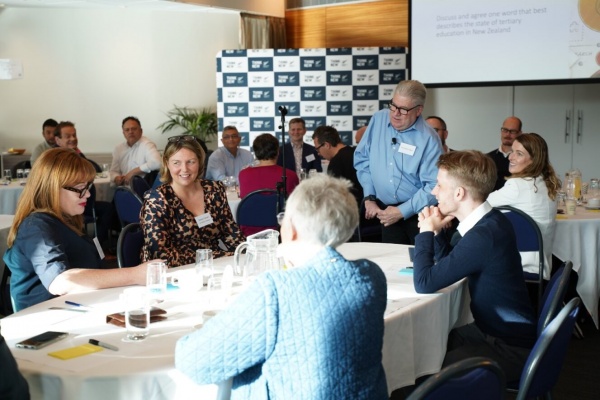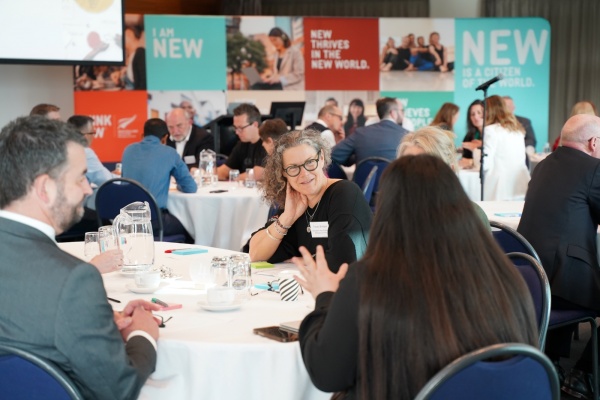Search
Showing 10 of 1954 results for NARSC 2016 conference registration fees student pre advance late July 2016
-
Prime Minister's Scholarships for Asia help students from New Zealand and India to showcase a unique cross-cultural collaboration
The students travelled to India and for five weeks, worked with local students from Indian fashion powerhouse Pearl Academy and artisans from Kala Raksha, an NGO in Kutch, Western India. Collectively they produced a collection of garments, which reflected a philosophy from the past to everyday life. The work helped students and artisans to develop an understanding of different cultural values and ability to think creatively and collaboratively.
“We are thrilled to have 15 Prime Minister’s Scholarship recipients from Whitecliffe College visit India and take this opportunity to collaborate with Pearl Academy students in fashion and sustainability.” said David Pine, New Zealand High Commissioner to India.
“New Zealand and India hold strong education ties and the Prime Minister’s Scholarship for Asia symbolises the New Zealand government’s commitment to further strengthen bilateral ties between both countries.”
Administered by Education New Zealand | Manapou ki te Ao, the Prime Minister's Scholarships for Asia is a unique scholarship programme that enables the rich exchange of language, culture, skills and opportunities. It not only highlights New Zealand government’s commitment to help grow strong connections between young New Zealanders and Indians but fosters global citizens by inspiring students to take action on pressing issues affecting the world.
Since 2013, the Prime Minister’s Scholarship for Asia and Latin America have enabled more than 2,400 New Zealanders to broaden their horizons through life-changing learning experiences in Asia and Latin America. Applications are open until 23 April for the 2023 group scholarship round. To find out more about the Prime Minister's Scholarships for Asia and Latin America, visit our website here.
-
NZ Universities strengthen ties with Indonesia during LPDP Delegation visit to NZ
LPDP is an Indonesian Ministry of Finance agency responsible for funding Indonesian students to pursue further study both in Indonesia and abroad. Since its inception in 2013, LPDP has sponsored over 35,000 Indonesian students and during this time, has sent 177 scholars to study with New Zealand. LPDP scholars coming here have studied in a wide variety of areas, most commonly in the engineering (energy), environmental science, education, and business subject areas.
ENZ's Acting Market Manager, Indonesia and Malaysia, Naluri Bella, welcomed the delegation to New Zealand from 27-29 March and said it was a privilege to host members from the LPDP to NZ and further strengthen ties with Indonesia.
"During this visit, ENZ showcased the quality of New Zealand’s university system by securing engagements with all eight universities in three separate roundtable meetings in Auckland, Wellington and Christchurch.
"This gave each university the opportunity to profile their institution and highlight areas of collaboration. A NZ Inc. roundtable meeting was also held to discuss co-funding opportunities and to develop a closer government to government relationship.”
The LPDP visit followed a successful trip to see LPDP in Jakarta in October 2022 by the then New Zealand Minister of Education, Chris Hipkins. During this trip, Minister Hipkins relayed that New Zealand was ready to welcome back its international students and used the opportunity to advocate for all New Zealand universities to be included on the LPDP approved partner list.
Ben Burrowes, ENZ's Regional Director Asia, added that it was exciting to be able to welcome the LPDP delegation to our shores following Minister Hipkins’ visit and that by Universities New Zealand (UNZ) who had led a senior delegation throughout Southeast Asia including a visit to LPDP while in Jakarta in March 2023.
"We are very pleased to report that following LPDP's meetings with New Zealand's universities and earlier advocacy by the Minister and UNZ, LPDP confirmed that they will advocate for all eight universities to be included in their approved institution partner list. This allows all of our New Zealand universities to receive LPDP funded scholars in the future."
A nation-wide Memorandum of Understanding (MoU) with UNZ is also currently being developed to support the flow of students from Indonesia and New Zealand.
-
From the CE: Our focus for the next 12 months
Kia ora tātou,
"To help providers of international education to build back onshore offerings" is Focus Area One of the New Zealand International Education Strategy. There are nine key short-term actions in Focus Area One. Education New Zealand Manapou ki te Ao is the lead Government agency in four actions and has an important role to play in eight of the nine. It can be no surprise then that for the next 12 months, and our next financial year starting in June, that the majority of ENZ's energy, time and resources will be focused on attracting learners to study with New Zealand.
This is no small challenge. Our borders have been open now for just eight months. And while students are returning, the latest visa application numbers I've seen report in the order of 43,000 applications (offshore and onshore), the recovery is variable at best. Even within the university sector, that on the face of it looks to have recovered better than others, the experience is mixed. Within the PTEs and English Language schools we have a long way to go to reach the levels of 2019 and early 2020. In such a highly competitive market, it is going to take some time to regain awareness with learners and overcome the head start other countries gained.
All our budgets are tight. At the very time we need to be investing and getting offshore to renew partnerships and networks, we are all resource-constrained and having to watch every cent. ENZ is no exception.
This means that for the next 12 months, more than ever, we need to focus. We need to focus our limited resources to where they have the greatest impact, and we need to be aligned as one with the sector.
India is an excellent example of a partner market that is worthy of focus. I have just returned from leading an ENZ delegation to India. India is forecasting economic growth of 6-7% every year for the next three to five years. They know, and their national education strategy makes it clear, they need educated, skilled and talented people to realise this opportunity. I repeatedly heard, "They want their people back".
That five Deputy Vice Chancellors joined the 23 sector representatives tells you how important India is. As one of the five said to me, "India today is what China was 15 years ago".
To be successful we need to agree that India is important. It is. We need to go there together. We will. We also need to work with our colleagues in other Government agencies to ensure they are aligned. This is what success looks like for me. And this is the level of focus on building back, and the level of partnership with the sector, that I expect from my ENZ teams over the next 12 months.
I will also work with them to secure the many gains we have made in government-to-government relationships, scholarships, diversity, equity, and inclusion, social licence, and in building a sustainable future. All the good work of the past two years remains important for the long-term future, set out in Focus Area Two: Building a new future for international education.
We are all very passionate about international education and its ability to transform lives. In 2023/24 when the sector is stronger than today, all of us will be better placed to address the short term and the medium to long term. Today our focus must be the immediate needs.
He moana pukepuke e ekengia e te waka
A choppy sea can be navigated
This proverb acknowledges the changing and challenging environment that we currently find ourselves in and how it can be navigated by collaboration and innovation.
Ngā mihi nui,
Grant McPherson
-
The new Study with New Zealand study matching tool is now live
Education New Zealand Manapou ki te Ao (ENZ) has launched this revamped study matching tool on the SwNZ website to replace the previous MyStudyNZ tool. It is a useful tool for Aotearoa New Zealand's education providers to be able to promote their courses to students online.
Geoff Bilbrough, ENZ’s General Manager of Marketing said that with the launch of the new StudywithNewZealand website, it was important to continue with the study matching tool as feedback from the sector had indicated it was a valuable tool for providers to connect with potential students and make them aware of the courses they offered.
"The sector told us that the previous matching tool, MyStudyNZ, had been positively received and tended to generate leads that were more engaged.
“We believe this new tool will continue to provide significant benefits to education providers and prospective students as it guides international students to study options that match their personal interests and past qualifications.
“To get the most out of the new tool, it is important that education providers’ profiles and course listings on the SwNZ site are up to date and accurate. This will help present your institution and your courses to the right students”, he added.
While ENZ does carry out a major data upgrade for all institutions twice a year (via our partner IDP), now is a good time to check your information is displaying accurately on our Study with New Zealand website. Education providers will have recently received an email with information on how to do this. It is a very straightforward process, and ENZ encourages providers to check their profiles and ensure that the name of your institution or school is correct and that your profile makes the most of all the features the system offers. Make sure your keywords are relevant and your profile includes full descriptions and photos to help you stand out to potential students.
Tertiary providers are being asked to check course study mode, start dates, costs, venue, and the duration as this information is used in the new study matching tool and the SwNZ search tool. The link to the admin platform to be able to check these details is available here: www.idp-connect.com/sign-in
If you did not receive this email, do not currently have access to the admin platform, or have any questions about the tool, you can email: info@studywithnewzealand.govt.nz.
A how to guide for tertiary providers has been developed and is available here.
-
Celebrating the University of Auckland’s 140-year journey in China
The University of Auckland recently commemorated its 140-year journey in China with a series of events held in six major cities across China, including Beijing, Guangzhou, and Chengdu. The celebrations took place from the 12th to 22nd May and were co-hosted by the University of Auckland, the University of Auckland International College (UP Education) and the University of Auckland English Language Academy. Education New Zealand’s Manapou ki te Ao (ENZ) China based team provided on-the ground support throughout the ten days of events.
Michael Zhang, ENZ’s Regional Director for Greater China noted the success of the commemorations in showcasing the study experience at New Zealand’s biggest university while fostering connections with agents and prospective students in China.
“Marking this anniversary milestone for the University of Auckland in China was a special occasion and proved a good opportunity for the University to rebuild international education connections with its Chinese stakeholders, highlighting its programmes and offerings.
“ENZ enjoyed being part of the celebrations, helping facilitate reconnections, and it was a fantastic opportunity to raise awareness for New Zealand amongst agents and parents. This was the largest New Zealand provider-hosted series of events in the post-Covid era in China,” said Michael.
Beyond providing updated information about academic programmes, the events also featured inspiring testimonials from alumni in China who shared their study experiences at the University of Auckland. Promoting such narratives helps to further strengthen New Zealand and the University’s reputation and influence in China.
The resounding success of the events and the positive response from attendees reflect the strong recovery of the international education sector, including for New Zealand as a destination, in China.
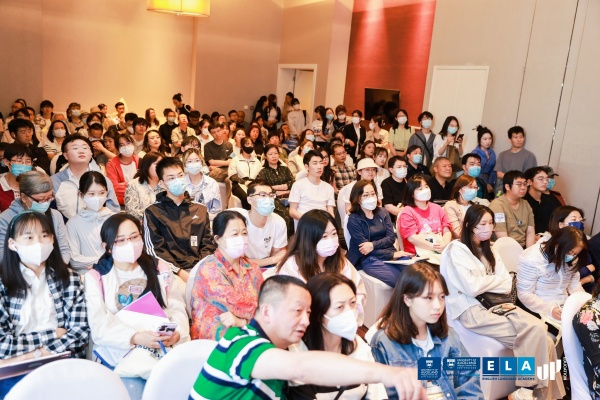
Standing room only at the Beijing students’ information session
-
Celebrating the 28 Pasifika graduates of the He Manawa Tītī Programme
He Manawa Tītī was a 13-week bespoke training course for emerging Pacific leaders delivered between February and May 2023 under the Manaaki New Zealand Scholarship Programme (MNZSP). The name He Manawa Tītī stems from a Māori Whakataukī (proverb) meaning ‘stout of heart’ and the course formed part of the Ministry of Foreign Affairs and Trade (MFAT) contribution to the suite of reparations for Pacific peoples announced in 2021 by the New Zealand Government. The press release announcing these scholarships is available here).
Emerging leaders (aged 25 – 35) from public, private, and voluntary sectors took part in the course combining academic and experiential training. Scholars participated in several weeks of online learning from their home countries and spent nine weeks of the programme based in Te Whanganui-a-Tara Wellington. He Manawa Tītī included modules on good governance and public sector leadership, trade policy in the context of the Pacific, and explored Pasifika values as key tenets of modern leadership.
Education New Zealand Manapou ki te Ao (ENZ) was involved in this kaupapa (programme of work) through its partnership with MFAT on the operational management of the MNZSP.
“It was fantastic to be able to celebrate these 28 inspiring young leaders as they completed this programme in Wellington last month. In true Pacific style, there was plenty of laughter, fun and colour, and it was a fitting celebration for all that these graduates have already achieved throughout their education and early careers,” said ENZ’s General Manager International, Lisa Futschek.
“The programme was designed by MFAT in collaboration with key Pasifika stakeholders and community members, highlighting Pasifika ways of learning and recognising the knowledge that is already held by Pasifika peoples. This collaboration also ensured opportunities for the scholars to build networks with Pasifika communities here in Aotearoa New Zealand, which connects them to our country now that they have returned home,” Lisa added.
The Manaaki New Zealand Scholarship Programme is part of the International Development Cooperation support that MFAT provides for developing partner countries across the globe. Manaaki alumni are well-known to be integral contributors to the development of their home countries.
“These Pacific emerging leaders are enthusiastic about returning home and putting into practice the leadership skills they have gained in Aotearoa,” said MFAT Lead Adviser, Alexandra Grace.
“While they have successfully completed this bespoke cohort course, real success will be demonstrated over coming years through what they achieve for their communities and countries. Scholars told me they won’t miss the weather (!) but will take with them enduring memories of the manaakitanga they experienced in our country.”
-
Hands-on agribusiness experience for NZ students in Brazil, Chile and Colombia
Despite being located on opposite sides of the world, New Zealand and Latin America have very similar climates, a phenomenon which serves as an opportunity for students in professions connected to agriculture to broaden their knowledge and practical skills. The Prime Minister’s Scholarship programme has supported students travelling to Brazil, Chile and Colombia to study this subject.
In operation since 2013, the Prime Minister’s Scholarship programme has already provided support for around 3,050 New Zealanders studying abroad, covering their travel, meals, accommodation, studies, technical visits, and journeys in different regions.
In 2022, Brazil was the most popular Latin-American country among group scholarship recipients, receiving visits from three groups. Brazil was also the first country to welcome New Zealand students from the program following the COVID-19 pandemic.
12 members of the Agronomy and Business Faculty of Lincoln University travelled to São Paulo in November last year. Over the course of five weeks, they visited and studied at three Brazilian universities, visiting farms and production centres in São Paulo, Minas Gerais, Paraná and Santa Catarina states.
According to Dr. Hugh Bigsby of Lincoln University, who coordinated the groups of students, their visits were organised so they could learn about the countries and their cultures through their food.
“Our programmes are called ‘agribusiness summer schools’ and the aim is to try to understand the local economy, over a period of five weeks, through processes involved in food production and the textile industry, for example,” Hugh said.
“In each country, we introduce the students to farms, sales chains and supermarkets. At the end of the program, they are required to present a business idea that can contribute to the commercial relations between New Zealand and each country visited, supporting exports and imports,” explained Hugh.
Amongst the places visited in Brazil were the Higher Education School of Agriculture of the University of São Paulo, in Piracicaba; the Faculty of Agrarian Sciences of the Federal University of Paraná, in Curitiba; and the experimental farms operated by the Federal University of Viçosa.
“The partnerships with the local universities of each country are fundamental to the success of our program, since each of them provides us with the local economic context, demonstrates technological advances that are underway, and explains the specific features of the local producers,” Hugh said.
At the same time, a group of 10 students, from the School of Agriculture and Development at Massey University, were in Chile to pursue their studies of agribusiness techniques. The students explored several regions across the country, visiting the Austral University of Chile, the Catholic University of Valparaiso, and Magallanes University in Punta Arenas.
In addition to the universities, the students went to the Santiago Botanic Gardens, dairy cattle farms, vineyards, avocado plantations, and food cooperatives.
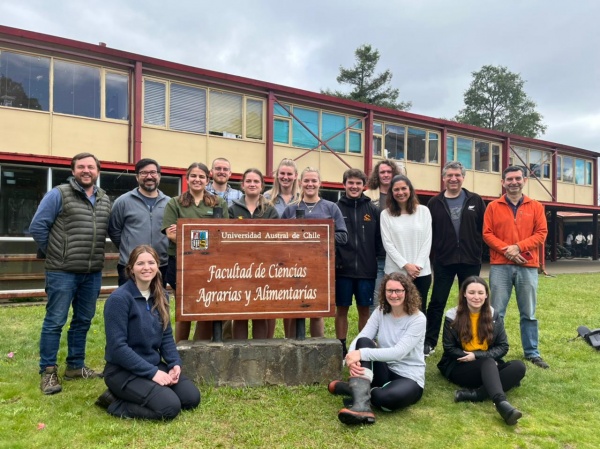
Massey University students at Universidad Austral de Chile, in Chile.
Massey University Professor Ignacio López, accompanied students on their visit. He said the trip was an incredible experience.
“The students were impressed with how the farmers are capable of sustainably farming foods in extremely harsh conditions” Ignacio said.
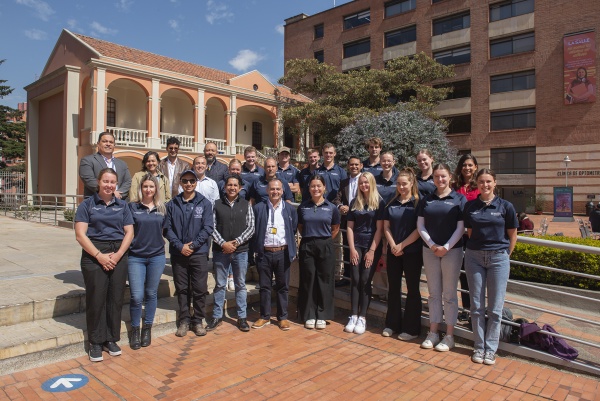
Lincoln University students at Universidad de La Salle, in Colombia.
A group of 20 students from the Agronomy and Business Faculty of Lincoln University travelled to Bogotá, Colombia, in January to study agribusiness. They were in the country for four weeks, studying at the La Salle University, located in the Colombian capital, and at Manizales University.
The students learnt about the wide range of agribusiness activities conducted in the country and in the Mercosur region, including detailed studies of Colombian coffee production techniques, which are considered a benchmark across the world.
The students from the three groups all returned home having recognised the creativity and experience of the Latin-American agricultural producers.
“For our students, the trip opened their minds to new possibilities and different ways of working with agriculture,” said Ignácio Lopez.
“They also realised that what they had experimented with can, indeed, be adjusted and applied in New Zealand” he said.
-
NZ-China Tripartite Partnership Programme Update
First established in 2005, the NZ-China Tripartite Partnership Fund is an ENZ sponsored initiative to support the development of diverse research relationships between New Zealand and China. This Fund supports our wider goals to develop strong global connections and highlight the quality of New Zealand education and research.
ENZ is pleased to announce the 2023-24 New Zealand – China Tripartite Partnership Fund recipients:
- “Teaching physical education for the 21st century: Building collaborative partnerships to enhance the teaching of PE in schools” Associate Professor Alan Ovens, the University of Auckland will partner with Beijing Normal University and Gannan Normal University.
- “Identification of molecular biomarkers of pain in red deer” Associate Professor Kevin Lawrence, Massey University will partner with City University of Hong Kong and Qingdao Agricultural University.
- “The Digitalization of School Governance: A Comparative Study of School Governance between China and New Zealand” Liuning Yang, University of Auckland will partner with Peking University and Guangdong University of Foreign Studies.
ENZ also recently caught up with the 2022 NZ-China Tripartite Fund recipients to hear how their Tripartite Partnership research projects are tracking a year on. Professor Nicholas Rowe at the University of Auckland visited their research partner in May to provide a workshop at Beijing Normal University.
Workshop participants at Beijing Normal University
Professor Rowe also virtually presented on their project, Teacher training for creativity and collaboration at the NZ-China Higher Education and Development Symposium 19 May at Yangzhou University.

The research project Professor Stephen Croucher and Associate Professor Ming Li from Massey University are working on with their Chinese partners was recently featured as a case study in a publication commissioned by New Zealand China Council. You can learn more about this Tripartite research project, “Protection of the Endangered Languages and Cultural Diversity in West China: A Case study of Miao Minority Language in Guizhou Province, China” in Collaborative Horizons.
Dr Shengnan Wang at the University of Auckland is currently recruiting participants for “The Project Hui: An innovative virtual exchange programme for preservice teachers in New Zealand and China.” Wang will travel to China in October to meet with research partners at Beijing Normal University to discuss publication and future collaboration opportunities.
The New Zealand China Tripartite Partnership Programme is experiencing a surge of activity as researchers between New Zealand and China plan and embark on travel to continue their research.
-
ENZ discontinues recognised agency programme
The decision followed a global review that included input from NZ education providers, education agents globally and NZ government agencies. It also considered practice across other jurisdictions and the global education agent landscape in a post-pandemic environment. The decision becomes effective immediately. The review was foreshadowed in the refresh of the New Zealand International Education Strategy in 2022.
“There are many positive aspects of our engagement with agents,” said General Manager of Sector Services, Sahinde Pala.
“Our global staff network and trusted relationships with agents are important factors in assisting students who wish to further their studies in New Zealand. ENZ’s AgentLab platform has also been a rich resource and information hub for education agents, particularly during the pandemic. We will continue to offer these services going forward.”
“But there were also issues. Our review showed that many successful agents did not see the value in joining the programme. The programme was also not accessible to emerging education consultants and organisations, and it did not meet the needs of New Zealand education providers.”
“After careful consideration of the feedback from many agencies and New Zealand education providers, it became clear that the existing programme was not fit for the emerging environment and the decision was taken to discontinue.”
“Looking forward, we want to ensure a more even-handed and efficient approach and feel the best way of achieving this is to open up the power of our international network, along with our information and training capability to all agents, regardless of their size, expertise or capability.”
While the ENZRA programme will cease, the new AgentLab platform will be launched in August and will include a wide range of updates relevant to education agents, including a calendar of events, details of upcoming webinars, resources, and latest news and updates from across the New Zealand education landscape.
Education agents will be able to access the same level of information and resources via the AgentLab platform. The discontinuation of the ENZRA programme will not affect this.
Any agent seeking more information or support should email: agent.help@enz.govt.nz
For further information:
Sai Raje | Senior Advisor Communications, Education New Zealand
+64 21 479 649
Notes to Editors:
About Education New Zealand (ENZ) https://www.enz.govt.nz/
Education New Zealand Manapou ki te Ao (ENZ) is the government agency responsible for taking New Zealand’s education experiences to the world. ENZ promotes a New Zealand education as one that teaches students to be critical thinkers, problem solvers and lifelong learners, which will help them succeed in their future careers and create a positive impact on the world.
With approximately 100 staff in 18 locations around the world, ENZ works closely with New Zealand’s diverse education sector including schools, English language providers, Private Training Establishments, Te Pūkenga (Institutes of Technology and Polytechnics), universities; and internationally with NZ Inc agencies, Government agencies and education providers to encourage sustainable growth and identify opportunities.
-
Exploring a vision for the ‘Future of International Education’ in Aotearoa
It was an action-packed week in Wellington for Emeritus Professor Bean and his business partner Helen Souness. They were invited to Wellington by Education New Zealand Manapou ki te Ao (ENZ) to facilitate discussions on what the future may look like for Aotearoa New Zealand’s international education sector.
Professor Bean is former Vice Chancellor of The Open University in the United Kingdom and RMIT University in Australia, and is now CEO of the Bean Centre. Along with his business partner Helen Souness, former CEO of RMIT Online, they partner with education experts, education providers and technology companies to shape an education future that works for the rapidly evolving needs of learners, and the evolving landscape of work they will eventually be part of.
On Tuesday 1 August, ENZ hosted a cross-section of representatives from our international education partners in government, industry and tertiary education institutions at a full-day workshop. The aim of the workshop was to bring together our sector and collectively explore a vision for the future of international education in Aotearoa New Zealand. This work is a key part of Focus Area 2 of the New Zealand International Education Strategy 2022-2030 (NZIES) and how we can diversify our educational products and services and modes of delivery to create a more sustainable and resilient future.
ENZ’s Chief Executive Grant McPherson opened the event and said that it was a privilege to host experts in the field of international education and have them share their knowledge and experience on what is disrupting the world of tertiary and international education globally and what other countries are doing in the face of these challenges.
''I would like to thank everyone that came along with such energy and great ideas. It was a fantastic day and the collaboration between government, industry, and the education sector served to generate some inspiring ideas on how, as a country, we can innovate and differentiate our international education sector to remain competitive on the world stage.
''This is especially important work given the challenges that the international education sector is facing not just in Aotearoa but also around the globe. Professor Bean and Helen Souness really inspired us to think about the future of our sector from the point of view those around us including learners, communities, and industry, in the face of these challenges’’, said Grant.
Professor Martin Bean and Helen Souness had this to say about the 1 August workshop.
YouTube YouTubeProfessor Bean also said “I was delighted to participate in a week of deep thinking as we collectively imagined a brighter future for New Zealand’s international education sector.
“It’s clear that the world of work and tertiary education is changing rapidly and it’s great to see that colleagues in New Zealand are determined to meet the challenges and build a strategy to thrive in turbulent times”.
Another highlight of the day included a presentation from social innovators Hinepounamu Apanui-Barr and Briana Te Haara-Barr on the work that Tokona te Raki: Māori Futures Collective is doing in finding indigenous solutions to global challenges. Their case study and discussion provided valuable input to the day as we then discussed Aotearoa’s unique value proposition.
ENZ’s Sector Engagement General Manager Wendy Kerr, whose team is leading the work involved with Focus Area 2 of the NZIES, said that in the days following the workshop, the ENZ innovation team met with our international education agency partners to reflect on the discussions and wonderful ideas that were brought to the table during the day’s workshop.
“It’s not often we get a chance to shape the future and this week has proved a valuable foundation for many in our sector to contribute to the course of the future of international education for Aotearoa. And what an exciting privilege that is.
She added, ''Now the hard work really begins, and ENZ will be leading the development of a green paper that will be the basis for consultation with our international education partners including government, education providers, industry, iwi, the wider community, and of course, our learners. Watch this space for the exciting developments to come!’’
